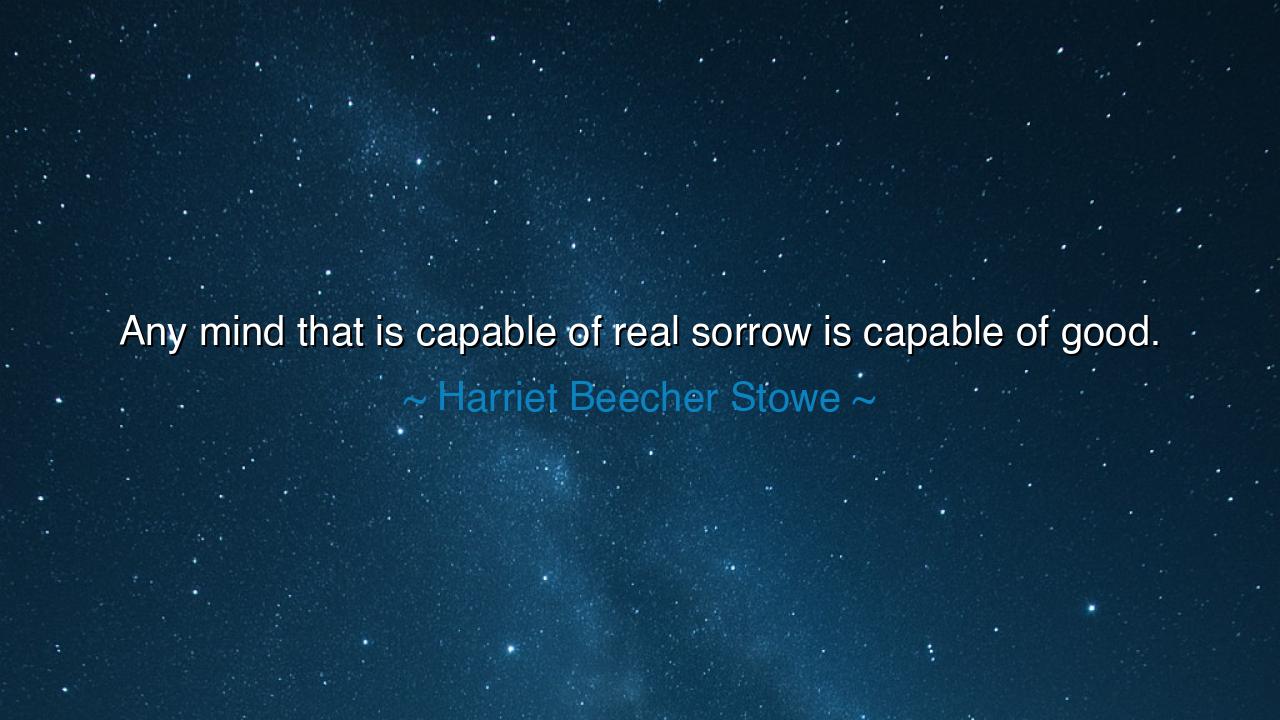
Any mind that is capable of real sorrow is capable of good.






“Any mind that is capable of real sorrow is capable of good.” So wrote Harriet Beecher Stowe, whose voice rang out like a trumpet in the dark days of bondage, stirring consciences across a nation. In these words she unveils a deep truth about the human heart: that the ability to feel sorrow—to be pierced by grief, to be wounded by compassion—is not a sign of weakness, but the very foundation of moral strength. For it is only those who have truly suffered, or who can share in the sorrows of others, who are capable of deep and lasting good.
To feel sorrow is to be awakened. The man who has never wept at injustice, never trembled at another’s pain, remains asleep to the higher laws of love. But the man whose heart breaks at the sight of suffering, who feels within himself the echo of another’s grief—such a one cannot remain idle. His sorrow becomes seed, and from that seed springs the fruit of mercy, of kindness, of action. Thus, Stowe speaks as one who understood the transforming power of grief: that through it, the heart is softened, and in its softness, goodness is born.
Consider Stowe herself. When she wrote Uncle Tom’s Cabin, she did not craft it merely from intellect or imagination, but from sorrow. She had lost her own child, and in that grief, she found the strength to imagine the grief of mothers whose children were torn from them by slavery. That sorrow became fire, and that fire burned across the world. Her novel stirred millions, moved hearts, and helped awaken a nation’s conscience. Here is the living proof of her words: a mind that feels real sorrow is capable of real good—so much so that it may even help bend the course of history.
History is rich with other examples. Think of Abraham Lincoln, who bore the weight of countless sorrows during the Civil War. The deaths of his sons wounded him deeply, and the endless reports of fallen soldiers pressed heavily on his spirit. Yet it was precisely his sorrow that made him merciful. In his second inaugural address, with the nation torn apart, he called not for vengeance but for healing: “With malice toward none, with charity for all.” The sorrow he carried carved out within him a wellspring of compassion, and from that compassion flowed greatness.
The ancients, too, knew this truth. The Greeks believed that suffering brought wisdom, that through grief the soul was purified. Aeschylus wrote, “Wisdom comes through suffering.” Stowe’s words echo this eternal wisdom. For sorrow strips away arrogance, humbles pride, and reveals the fragility of life. In that revelation, the heart becomes tender, capable of seeing others not as strangers but as kin. Sorrow is the doorway to compassion, and compassion is the path to good.
Let us take the lesson for ourselves. Do not harden your heart against sorrow, whether it is your own or that of others. When grief comes, let it teach you. Let it deepen you. And when you witness the suffering of another, do not turn away. Allow their sorrow to touch you, for in that touch lies the stirring of goodness. A heart that cannot feel sorrow is barren, but a heart that embraces it becomes fertile ground where love, mercy, and justice can grow.
Practically, this means living with attentiveness. Seek to understand the pain of others, not by dismissing it, but by entering it with empathy. When you feel sorrow in your own life, do not let it consume you into despair—let it guide you into service, into kindness, into building something good from the ashes. For sorrow, when received rightly, is not the end but the beginning: the beginning of goodness, of strength, of love.
Thus remember Stowe’s wisdom: “Any mind that is capable of real sorrow is capable of good.” Treasure your sorrow, for it is the mark of your humanity. Honor the sorrow of others, for it is the seed of compassion. And live in such a way that your grief becomes not a weight that breaks you, but a light that guides you toward good. In this way, sorrow is transformed into strength, and the heart that weeps today becomes the hand that heals tomorrow.






AAdministratorAdministrator
Welcome, honored guests. Please leave a comment, we will respond soon